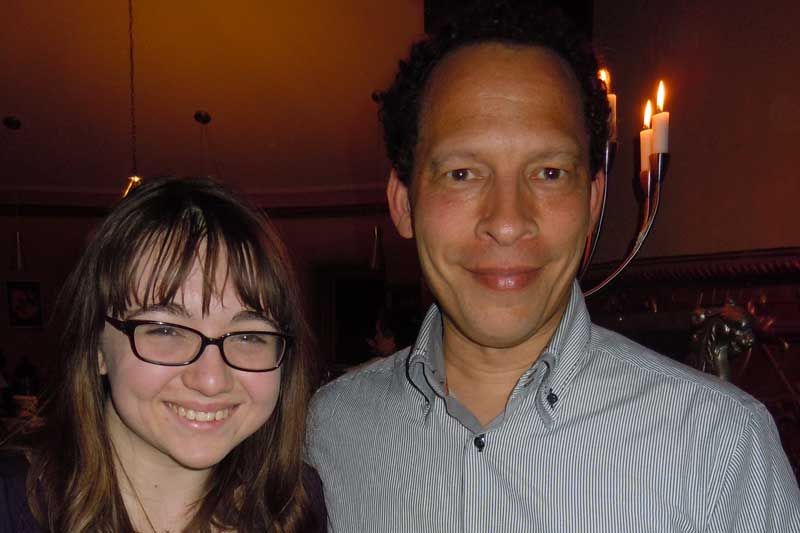May 15, 2013
On April 27 a small but capacity crowd filled the main hall at Wintergreen Studios, first dining and then listening to a reading by award-winning Canadian author Lawrence Hill. The reading wrapped up a three-day writers' workshop Hill led at Wintergreen from April 24-27.
Hill is probably best known for his award-winning novel "The Book Of Negroes" (2007) which has sold over 600,000 copies. Hill offered listeners first an in-depth look into his development as a writer by focusing on the theme of identity, which looms large in each of his three novels to date.
From his first, “Some Great Thing (1992), which he described as “a take-off of life in a newsroom” (Hill worked at the Winnipeg Free Press before leaving for Spain at the age of 27 to test his mettle as a writer), Hill read from a section where the characters, husband Ben and wife Louise get all fired up about choosing a meaningful name for their infant son. When Ben suggests the name “Euripides Homer Grafton”, Louise “put the baby in its room, closed the door and went to the kitchen cupboard. She launched a tea cup at his (Ben's) head. It missed and exploded against the wall. 'You're not naming my baby after any Greeks,'” she said.”
Hill read next from his second novel, "Any Known Blood" (1999), which follows the lives of five men over five generations who are all from the same family and who all go by the name Langston Cane. The last born, Langston Cane, who in the novel has researched his family history, speaks of being often mistaken as being of different racial origins. He states at one point in the book how, “My game of multiple racial identities continued until 18 months ago when my wife left me.”
From the Book of Negroes, Hill read a segment from the main character, Aminata Diallo's point of view. Diallo's voice at the end of her life opens up the novel. Hill read of how she goes to a school and is asked questions by young students, one of whom asks her why she is so black.
"'I asked why she was so white. She said she was born that way. 'Same here' I replied.
'I can see that you must have been quite pretty even though you are so very dark,' she (the student) said.”
Hill also spoke of his most recent work, an essay titled “Dear Sir, I Intend To Burn Your Book: An Anatomy of a Book Burning”, which was born from a real event that occurred to Hill following a trip to Amsterdam, where the Book of Negroes sold very well. Hill spoke to and was toured around the Dutch Surinamese community. Following what he thought was a pleasant all-day visit there, he returned home and a month later received what he called “the most surprising email of my life”, which came to him from representatives of the Surinamese community that he had recently visited. The letter said,
“Dear Sir Lawrence Hill,
We, descendants of the slaves of the former Dutch Colony Suriname want to let you know that we do not like the book with the title "The Book of Negroes”. We struggled for a long time to let the word nigger disappear from the Dutch language and now you set up your Book of Negroes, a real shame. That's why we made the decision to burn this book on June 22, 2011.”
Hill was shocked but wrote what he described as a very polite Canadian reply explaining his reasons for choosing the book's title, which comes from an actual historical document kept by British naval officers at the end of the American Revolutionary War. It documents the 3,000 blacks who had served the king in the war and who were fleeing Manhattan for Canada in 1783.
Hill said, “I was shaken [by the email] mostly because this hostility was coming from a group who I thought would be among my readers and from a community that I wanted to feel attached to.”
Hill said of book burning, “It is not conducive to civil discourse, and it's not a door that opens to dialogue. It is meant to intimidate writers, book sellers and publishers and can lead in many cases to violence.” Currently Hill is finishing up a series of Massey Lectures on the subject of blood, which will soon be read and published.
Hill's one piece of advice to young writers. “GYAIC!” which he defined as “Get Your Ass In Chair.”
More Stories
- Province clarifies stance - Says Private Well Water Testing Will Continue
- Frontenac County Stays Internal for CAO - Appoints Kevin Farrell
- Addington Highlands Tax Bill Going Up 6.93%
- Perth Road United Church Donation to The Grace Centre
- 21 Years Of Dump Life Left At South Frontenac Waste Site
- Eclipse 2024 – Once In A Lifetime
- National Tourism Week
- NeLL Spring Open House and Anniversary Concert
- 25 years at Bishop Lake Outdoor Centre
- Grounds Contracts Down, Custodial Contracts Up In Central Frontenac

